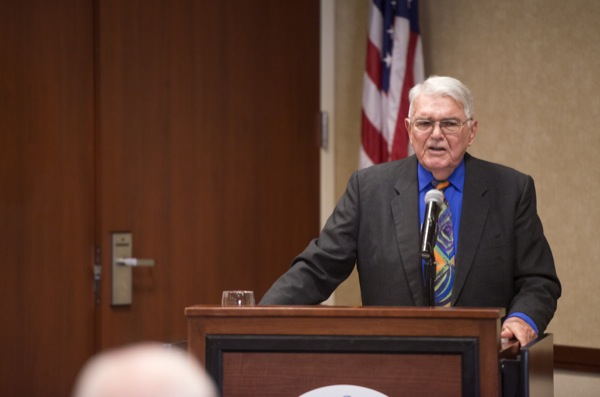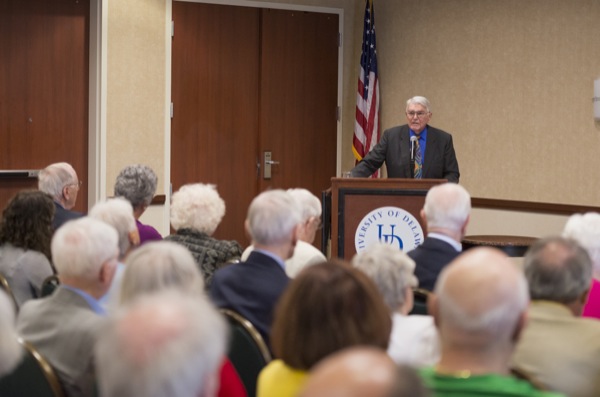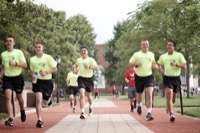'My Intellectual Journey'
Boyer discusses career as political scientist during UDARF presentation
12:51 p.m., April 17, 2013--Against the advice of his high school principal, William W. Boyer decided to go to college. That was the start of an academic odyssey that reached from the former British West Indies to the University of Delaware, including stops in Asia and Latin America along the way.
Boyer, Charles Polk Messick Professor Emeritus in the Department of Political Science and International Relations, related his experiences as a public servant, professor and author during a "My Intellectual Journey" lecture, sponsored by the UD Association of Retired Faculty on April 11 at the Courtyard Newark-University of Delaware.
People Stories
'Resilience Engineering'
Reviresco June run
Visiting scholar at UD’s Center for Applied Demography and Survey Research, Boyer is an internationally recognized consultant, lecturer and scholar on developing countries and has written several books on public policy issues.
Describing himself as being more interested in girls and sports in high school, Boyer recalled being called into the office of his high school principal.
“He said, ‘I understand you want to go to college — don’t,'” Boyer said. “I took the test and passed and went to the College of Wooster in Ohio.”
Like many young men of his generation, Boyer’s plans were put on hold when the forces of Imperial Japan attacked the United States Naval Base at Pearl Harbor on Dec. 7, 1941.
“We were called the war class. I knew I would be in that war, so I went into the U.S. Army Air Corps,” Boyer said. “I was stationed in Antigua in the British West Indies.”
During his three years in the Caribbean, Boyer saw firsthand what he perceived to be the injustice with which the inhabitants were treated.
“I did cursory research, and I found the system was rigged to exploit the native population,” Boyer said. “This was when I became interested in colonialism.”
Placing high on an Army aptitude test that indicated he might do well in careers which included clergy, law and journalism, Boyer opted to be a teacher in the field of international relations and American political and cultural history.
As a G.I. Bill (the Servicemen’s Readjustment Act of 1944) beneficiary, Boyer wanted to know which university had the best political science graduate school.
“I was told the University of Wisconsin,” Boyer said. “When I got there, there were 60 veterans who had descended on the department that had not experienced an increase in staff. As a result, they put a lot of obstacles in the path of our graduate education, but I hung with it.”
Earning his master’s and doctoral degrees at the University of Wisconsin, Madison, Boyer worked on the staff of Wisconsin Gov. Walter J. Kohler Jr., eventually deciding that what he really wanted was to become a political scientist.
While Boyer would be engaged in research and teaching at the University of Pittsburgh, where he served as an associate professor for 10 years, his intellectual journey was about to take him around the world as a foreign specialist for the U.S. Department of State, visiting undeveloped countries.
“Our people would go to these countries for four months, and people from these places would come to the America for the same period,” Boyer said. “I really enjoyed that. Each country was different, but they all had common problems as developing nations.”
Boyer next found himself at Kansas State University, where he became the first head of the school’s new political science department and the founder of the Alfred M. Landon Lectures on Public Issues, where he coordinated convocation lectures.
In this capacity, Boyer brought many famous figures to Kansas State, including Dr. Martin Luther King Jr. and U.S. Sen. Robert Kennedy, whose assassinations left him saddened and ready for a change of direction.
“When Dr. King and Bobby Kennedy were assassinated, I felt a great sense of loss,” Boyer said. “They were people I got to know — they were my heroes.”
Realizing that he did not want to continue arranging for convocation speakers as part of his academic duties, Boyer knew he wanted to go elsewhere and was ready for a change when he received an offer to head the political science department at UD.
“I accepted the position and got here right when the University was embroiled in dissent of the Vietnam War,” Boyer said. “The student government asked me to give a speech on this at Mitchell Hall in October of 1969. I did, and I thought I would be penalized for this.”
Instead, then-President E. Arthur Trabant asked that copies of the “Agony of Vietnam” talk be printed for distribution, Boyer said.
“The University published 11,000 copies, and when the war extended to Cambodia in May 1970, another 5,000 copies were ordered,” Boyer said. “This was my way of being introduced to the Delaware way to protest the war.”
After retiring in 1994, at the then-required age of 70, Boyer opted to author several books, including Delaware Politics and Government, which he coauthored with Edward Ratledge, director of the UD Center for Applied Demography and Survey Research, published by the University of Nebraska Press (2009).
Other titles by Boyer — the holder of three Fulbright awards and lecturer at 41 universities and several government institutes overseas — include Governing Delaware: Policy Problems in the First State (University of Delaware Press, 2000).
Looking back on the time when he was not encouraged to pursue a college degree, Boyer said he tried to maintain a special empathy with students in his classes who might appear to be struggling or unsure of where their own intellectual path would lead.
“I tried to be a good counselor and to understand their situation and their interests,” Boyer said. “I don’t think there is any greater calling than being a UD professor.”
Article by Jerry Rhodes
Photos by Kathy F. Atkinson












